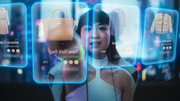Article
Formation VP defines personalization — why it's critical to the retail customer experience
Nicole Amsler, vice president of marketing at Formation — a company that helps brands reach millions of customers each day — shares her insights on what retail personalization should look like in 2020 and beyond.
November 5, 2019 by Judy Mottl — Editor, RetailCustomerExperience.com & DigitalSignageToday.com
When it comes to retail customer experience, there's a word popping up everywhere: personalization. Customers want a personal interaction — a personal experience and connection with a retailer and a brand.
It sounds easy enough given all the data retailers have about customers, but a deeper look reveals lots of the data may not be helpful, while still more of the data needed is not within reach. Yet, every day more customers expect and demand a personal experience.
Retail Customer Experience reached out to Nicole Amsler, vice president of marketing at Formation, which leverages AI and machine learning (ML) for personalization and looks at the whole human when personalizing to gain insight on what retailers should be doing, as well as why and what is required to deliver a pesonalized consumer experience.
Amsler expects a dynamic change within the next decade, during which retailers will let go of today's common product-centered approach and embrace the customer as their inspiration. Here's more of what she shared.
Q: Personalization is a very familiar term and it's being redefined in the digital retail environment. How do you define personalization in the retail context and how critical is it today?
A: As retail brands look to make their shopping experiences stickier, they need to develop loyalty programs that deepen their relationships with each customer. Building a one-to-one relationship with customers is important now that customers have more options than ever before. Once brands understand what drives each customer to order, they can create personalized promotions tailored to address those motivations. Brands must wake up and realize that personalization is key to inspire loyalty and brand stickiness.
Q: What role has the consumer played in defining personalization? For instance, are they expecting it at this point or demanding it, and is there a form of personalization that is proving most valuable? And, on the flip side, what's the least valuable type of personalization?
A: Consumers are inundated by promotions and marketing offers. To cut through the noise and encourage consumers to act, brands need to focus on an individual's underlying motivations and form offers that are personally tailored for greater engagement. Today, consumers expect personalization as a standard of service and want to be recognized as an individual. However, they don't feel brands are keeping pace with expectations. Emails with an interchangeable name up top aren't cutting it. Consumers want offers specifically designed just for them.
Q: What role is AI playing today with personalization and is it in its infancy or maturing as a technology that can make personalization a valuable strategy?
A: AI is still in its infancy, but it is one piece that is required to achieve true one-to-one personalization. It's not only about leveraging AI to determine insights about the customer, but also requires applying machine learning to get smarter and more effective offers over time. This information is used to automatically create millions of offers, eliminating the manual steps that make scalable, one-to-one personalization impossible today.
Q: Can you share any examples of how AI is part of the redefining of personalization?
A: AI and machine learning are redefining personalization around the individual due to the technology's ability to scale decision-making. It's been mostly impossible to create truly individualized offers. Even segments become cumbersome at a certain scale.AI alleviates issues of scale and allows personalized product suggestions and promotional offers to be targeted to individuals, rather than segments. Personalization can focus on a person's wants and behaviors rather than the fact that they're a man in their (stet) 40s, for example. AI and machine learning have also allowed brands to build their core product offerings and customer experiences around personalization.Personalized clothing selection services are a great example of this in retail. The personal shopper concept is bolstered by machine learning in a way that makes individualized product recommendations possible for a far larger group of people.
Q: What do you predict or expect in 10 to 20 years with personalization in the retail customer experience?
A: In the next 10 years, I believe retailers will let go of the product-centric approach to marketing and embrace the customer as their inspiration. It is clear that brands like Amazon and Stitch Fix have been very successful at focusing on the customer experience and personalizing offers and promotions based on the insights collected. Other brands will follow suit and customer-centric personalization will be the name of the game.
 ChatGPT
ChatGPT Grok
Grok Perplexity
Perplexity Claude
Claude




